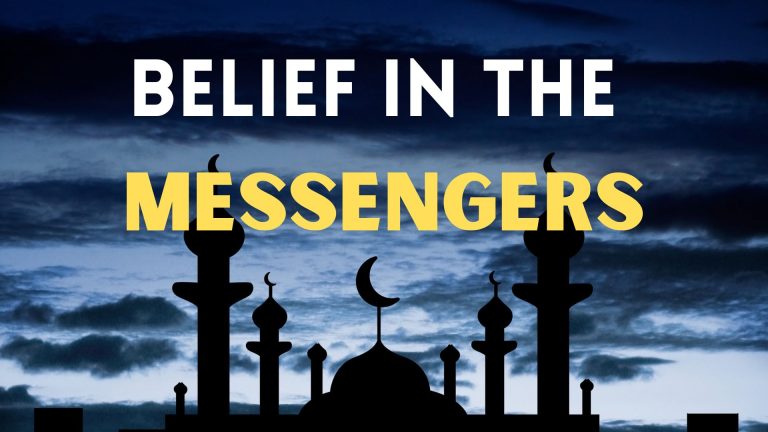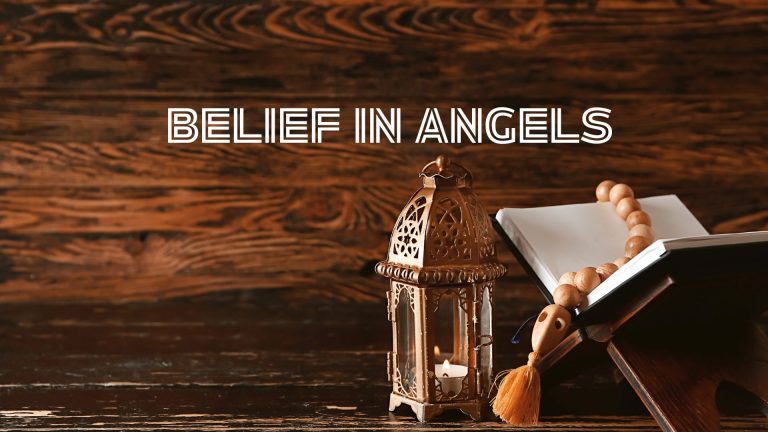Belief in God
The Significance of Monotheism in Islam
One of the foundational principles of Islam is the belief in God, which encompasses His role as the sole Creator, Sustainer, and Nourisher of the universe. However, mere acknowledgment of this belief is insufficient.
Historical examples demonstrate that some individuals acknowledged the Supreme God’s existence and attributed divine qualities to other entities. Therefore, true monotheism requires recognizing God as the only worthy object of worship and refraining from associating partners with Him.
Additionally, Islam emphasizes that God is unparalleled and incomparable. He has no progeny or ancestry, making Him distinct from any human or earthly conception.
Furthermore, Muslims believe that God is the universal God, not exclusive to any particular group, tribe, or race. This principle underscores the inclusive nature of Islam, affirming the belief in one God for all of humanity.

The Worship of God Without Any Associates
In the Quran, the central religious text of Islam, the falsehood of worshiping anything other than God is repeatedly emphasized. Addressing those who worship idols and man-made objects, the Quran asks how they can worship things they have created when it is God who has created both them and all that they make (37:95-96).
Similarly, the Quran questions those who take protectors or partners besides God, pointing out that such beings cannot even benefit or harm themselves, let alone others (13:16).
The Quran also challenges the worship of celestial bodies, recounting the story of Abraham, who, upon seeing a star, a moon, and then the sun, successively proclaimed them as his lord, only to reject them all when they set, realizing that God, the Creator of the heavens and the earth, is the one true deity (6:76-79).
These verses remind believers of the futility and falsehood of worshiping anything or anyone other than God, who alone is deserving of worship and obedience.
The Significance of Belief in God
Once a person has come to know and has belief in God, they must maintain unwavering faith in Him, resisting the temptation to deny the truth. As Prophet Muhammad stated, true faith is deeply rooted in the heart and is evident through one’s actions. This faith should profoundly influence a person’s perspective and conduct.
A profound result of faith is the overwhelming gratitude towards God, which can be considered the essence of worship. Believers love and appreciate God for the countless blessings He has bestowed upon them.
They are acutely aware that their good deeds can never match God’s favors, and thus, they constantly strive to please Him, remembering Him frequently. The Quran reinforces this sense of gratitude by frequently recounting God’s attributes.
“He is God: there is no deity except Him. He is the Knower of the unseen and the witnessed; He is the Entirely Merciful, the Especially Merciful. He is God: there is no deity except Him, the Sovereign, the Pure, the Perfection, the Bestower of Faith, the Overseer, the Exalted in Might, the Compeller, the Superior.
Holy is God above whatever they associate with Him. He is God, the Creator, the Inventor, the Fashioner; to Him belong the best names. Whatever is in the heavens and earth is exalting Him. And He is the Exalted in Might, the Wise.” (Quran 59:22-24)
1. Belief in God’s Lordship and Divinity
Belief in God entails acknowledging that He alone is the Lord, without any partners or helpers. He is the Creator, the Sovereign, and the Controller of all affairs. As stated in the Quran, “Surely, His is the creation and commandment” (7:54). Everything in the heavens and the earth belongs to Him, and He manages and regulates all affairs (32:5).
This belief also encompasses the recognition of Allah’s divinity as the One True God, with no partner or associate. “Allah bears witness that there is no god but He, and the angels, and those knowing (also give this witness); (He always) maintains His creation in justice” (3:18). Anything worshipped besides Allah is false, as He is the only True God. “That is because Allah He is the Truth, and what they invoke besides Him, is falsehood” (22:62).
Calling anything else a god alongside Allah does not give them the rights of divinity. They are merely names without any authority from Allah (53:23). No one, whether an angel close to Him or a Prophet sent by Him, deserves to be worshipped or singled out for worship except Allah. From the first to the last, this is the fundamental call of all the Messengers to declare, “There is no god but Allah.” (21:25).
Despite this clear message, polytheists reject this belief and take other gods alongside Allah, seeking their support and help. This belief in the oneness of Allah in His Lordship and Divinity is the cornerstone of Islamic monotheism, emphasizing exclusive worship and devotion to the One True God.
2. Belief in God: The Sole Worthy Object of Worship
At the core of Islam lies the declaration that ‘there is no one worthy of worship except One God (Allah).’ This proclamation encapsulates the essence of the faith, emphasizing the absolute oneness of God in every conceivable aspect.
It asserts that God stands alone without partners; He is self-existing and self-sufficient. This fundamental belief not only affirms the uniqueness of God but also emphasizes His unrivaled power and love.
Contrary to being an abstract concept, Allah is portrayed in Islam as a deeply personal and involved deity. He is ever near, caring for His creation, and it is to Him alone that humanity owes its existence. This belief in the oneness of God forms the foundation of Islamic theology, shaping the way Muslims perceive the world and their place within it.

3. Belief in the Names and Attributes of Allah
Believers in Islam affirm the names and attributes that Allah has affirmed for Himself in the Quran and the teachings of the Prophet Muhammad (PBUH), without distorting their meanings, denying them, asking how they are, or likening them to His creation.
Allah says in the Quran, “And (all) the Most Beautiful Names belong to Allah, so call on Him by them, and leave the company of those who belie or deny (or utter impious speech against) His Names. They will be recompensed for what they used to do” (7:180).
This verse indicates that the most beautiful names belong to Allah. Another verse states, “His is the highest description (i.e., none has the right to be worshipped but He, and there is nothing comparable unto Him) in the heavens and the earth. And He is the All-Mighty, the All-Wise” (30:27), affirming that the attributes of perfection belong to Allah.
While there has been much dispute and division among Muslims regarding the names and attributes of Allah, it is important to refer such disputes to the Quran and the Sunnah (teachings) of the Prophet Muhammad.
Anyone who deviates from the understanding of the companions regarding the names and attributes of Allah is considered to be straying from the path of guidance. It is necessary to believe in what Allah and His Messenger have affirmed, without distortion or denial, and to adhere to the understanding of the companions, as they are the exemplars of true guidance.

How To Avoid Misinterpretations of Allah’s Names and Attributes?
It is crucial to avoid four pitfalls when understanding Allah’s names and attributes, as failing to do so indicates a lack of true belief. These pitfalls are distortion (tahreef), denial (ta’teel), likening Allah to His creation (tamtheel), and discussing how (takyeef).
1. Distortion (Tahreef)
his involves changing the meaning of Quranic and Prophetic texts to something other than their true intent. For example, contrary to its actual meaning, some distort the meaning of “the Hand of Allah” to signify His blessing or power.
2. Denial (Ta’teel)
Denial refers to rejecting Allah’s beautiful names and attributes, claiming that He does not possess them. Anyone who denies a name or attribute of Allah established in the Quran or Sunnah does not truly believe in His name and attributes.
3. Likening Allah to His Creation (Tamtheel)
This involves likening Allah’s attributes to those of humans, such as saying that Allah’s Hand is like a human hand. This form of comparison is incorrect and contradicts the Quran’s assertion that “There is nothing like Him, and He is the All-Hearer, the All-Seer” (42:11).
4. Discussing How (Takyeef)
This refers to attempting to understand or describe what Allah’s attributes are. Such discussions are invalid, as humans cannot fully comprehend the nature of Allah’s attributes. As the Quran states, Allah’s knowledge is beyond human grasp, “but they will never encompass anything of His Knowledge” (20:110).
True belief in Allah’s names and attributes involves affirming them as stated in the Quran and Sunnah without distorting their meanings, denying them, likening them to His creation, or discussing how they are. It is essential to adhere to the correct understanding of Allah’s names and attributes, seeking guidance from the Quran the Sunnah, and understanding the righteous predecessors.
FAQs
Why is belief in God so central to Islam?
Belief in God, or Tawheed, is the foundation of Islamic monotheism. It emphasizes God’s absolute uniqueness and supremacy, highlighting His role as the sole Creator, Sustainer, and Nourisher of the universe.
How does Islam view the worship of other beings alongside God?
Islam categorically rejects the worship of anything or anyone besides God. This includes idols, human beings, celestial bodies, or any created thing. The Quran emphasizes that worship is exclusively reserved for God, who deserves adoration, obedience, and submission.
What is the significance of faith in Islam?
Faith in Islam is not merely a mental acknowledgment but a deep-seated belief that impacts one’s actions and attitudes. It is characterized by gratitude towards God for His countless blessings, a profound sense of love and reverence for Him, and a constant striving to please Him in all aspects of life.
How does Islam view the names and attributes of God?
Muslims believe in affirming the names and attributes of Allah as mentioned in the Quran and the teachings of the Prophet Muhammad. However, they avoid distorting the meanings, denying them, likening them to His creation, or discussing how they are.
Summary
Belief in God is the cornerstone of the Islamic faith, emphasizing His unique attributes, role as the sole Creator, and the object of worship. This belief shapes how Muslims perceive the world and their relationship with God.
Understanding and affirming the names and attributes of Allah without distortion or denial is essential in Islam, reflecting a deep reverence and love for the Divine. Islam calls for exclusive worship of God, rejecting any form of association or partnership with Him. This monotheistic belief forms the foundation of Islamic theology, guiding Muslims in their spiritual journey and daily lives.





